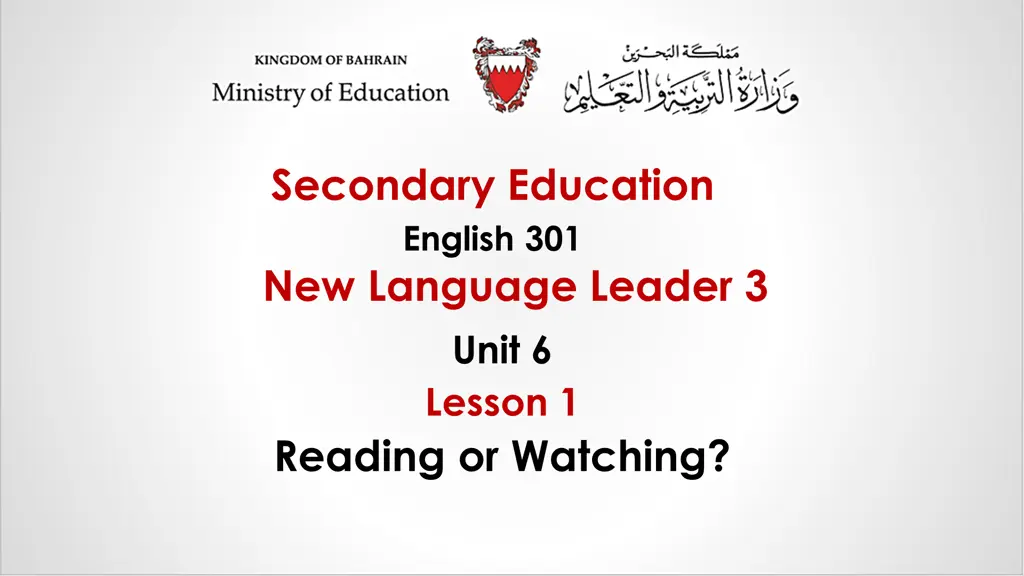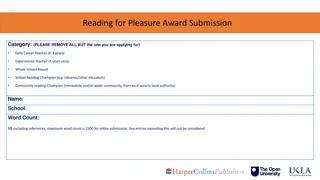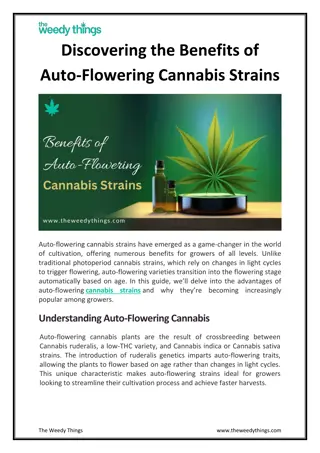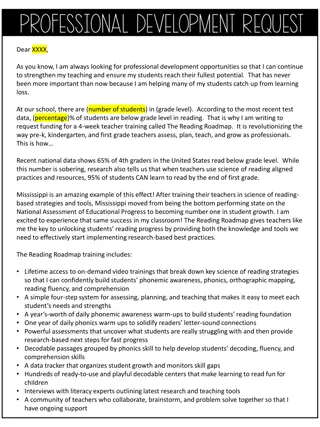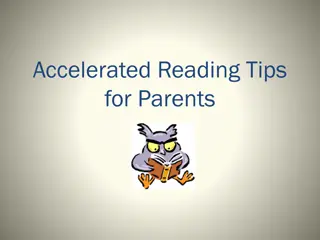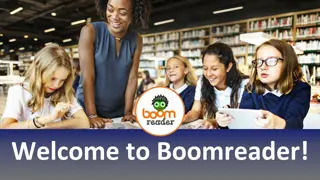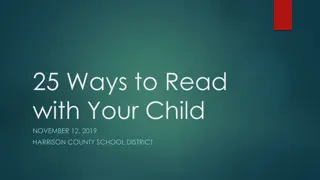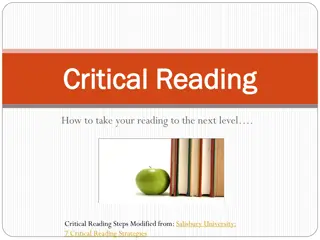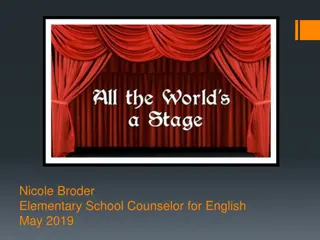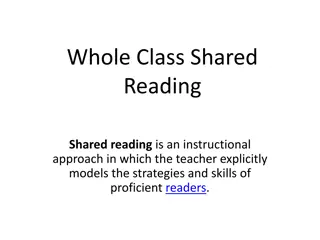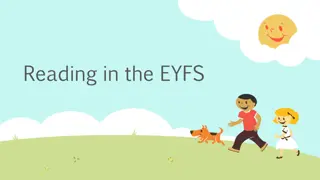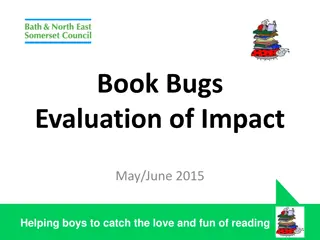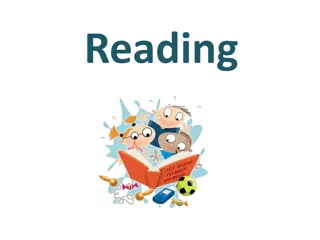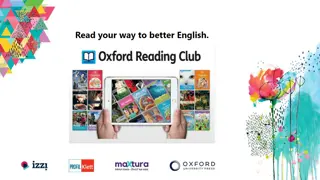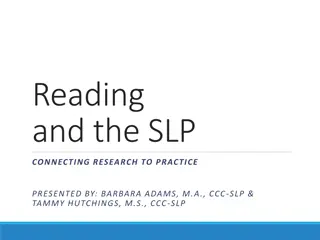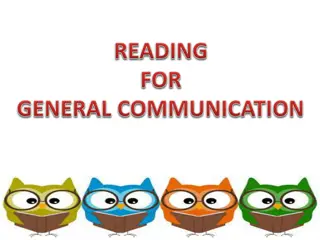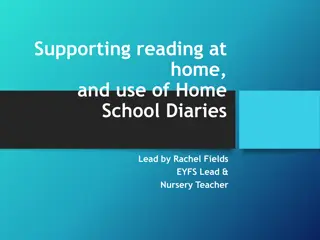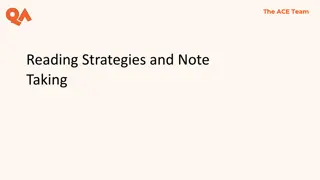Discovering Books: Benefits of Reading
Exploring the numerous advantages of reading, enhancing vocabulary, analytical thinking, and reducing stress while engaging in literature. Develop language skills, expand knowledge, prevent cognitive decline, and strengthen mental abilities through reading. Emphasizing the importance and positive impacts of reading on personal growth and well-being.
Download Presentation

Please find below an Image/Link to download the presentation.
The content on the website is provided AS IS for your information and personal use only. It may not be sold, licensed, or shared on other websites without obtaining consent from the author. Download presentation by click this link. If you encounter any issues during the download, it is possible that the publisher has removed the file from their server.
E N D
Presentation Transcript
Secondary Education English 301 New Language Leader 3 Unit 6 Lesson 1 Reading or Watching?
Eng.301 Unit 6 Lesson 1 Reading and Watching OBJECTIVES By the end of the lesson, you will be able to: identify the differences between fiction and non-fiction and their corresponding genres. extract specific information and language items from a reading text. expand your range of vocabulary in the context of literature and film. practise mixed tenses exercises.
DID YOU KNOW? On estimate, there are over 900,000 new books published each year. Reading for six minutes a day reduces stress by 68 percent. When children have a home library, as few as 20 books of their own at home (think: one bookshelf full), they achieve three more years of schooling than children who don t have any books at home. Read 20 minutes a day, and you ll read 1,800,000 words per year. Reading is the fastest way to build vocabulary. A third of U.S. teenagers haven t read a book for pleasure in at least a year, according to a new survey from the American Psychological Association (APA). And it s not because they re too busy watching TV. The longest-ever book title consists of over 3,700 words. In Iraq, booksellers leave books outside at night because the reader does not steal and the thief does not read. Eng.301 Unit 6 Lesson 1 Reading and Watching
Why are Books Important? To know the benefits of reading books, complete the short text with the words in the box below. Once you are done, click the Enter key to check your answers. broaden vocabulary analytical engaged writing prevent reduces discussion benefits experience Reading a book is an ..that can be very enjoyable if the story unfolding before our eyes wins us over. But beyond just satisfaction, reading is an activity that has many________________. First, it's the best way to improve your spelling and_____________. Indeed, by reading regularly, one has a more accomplished mastery of the language. Various studies have shown that a child who reads regularly has a higher level of vocabulary than a child who does not read. He also makes fewer mistakes in_____________. In addition, reading increases our knowledge and our know how. When reading, we always record new information that, one day or another, will come out in a _____________or other situations, like acquired knowledge. Reading regularly and everything; therefore, allows you to _____________your culture. Reading is also a mental stimulation which, according to various studies, can help slow down (or________) Alzheimer's disease and dementia. Indeed, when we read, we keep our brain active and_________, which allows us to keep control. Finally, among the other benefits of reading, we can add that it contributes to a _________in stress, that it improves memory and that it strengthens the skills of ___________thinking. Eng.301 Unit 6 Lesson 1 Reading and Watching
Now, check your answers. Reading a book is an ..that can be very enjoyable if the story unfolding before our eyes wins us experience over. But beyond just satisfaction, reading is an activity that has many_____________. benefits First, it's the best way to improve your spelling and____________. Indeed, by reading regularly, one has a more vocabulary accomplished mastery of the language. Various studies have shown that a child who reads regularly has a higher level of vocabulary than a child who does not read. He also makes fewer mistakes in___________. writing In addition, reading increases our knowledge and our know how. When reading, we always record new information that, one day or another, will come out in a ______________or other situations, like acquired knowledge. Reading discussion regularly and everything; therefore, allows you to ___________your culture. broaden prevent Reading is also a mental stimulation which, according to various studies, can help slow down (or________) Alzheimer's disease and dementia. Indeed, when we read, we keep our brain active and___________, which allows engaged us to keep control. reduces Finally, among the other benefits of reading, we can add that it ___________ stress, improves memory and analytical strengthens the skills of __________thinking. Eng.301 Unit 6 Lesson 1 Reading and Watching
All books are classified as either fiction or nonfiction Nonfiction books contain factual information whereas Fiction refers to literature created from the imagination. Classify the following literary examples / genres in the right broad genre/ category: fiction or non-fiction. Genre is a style or category of art, music, or literature. action biography history science-fiction auto-biography travel guides horror thriller how-to manuals journalism westerns plays memoirs fantasy academic texts historical Fiction Non-fiction action how-tomanuals westerns biography journalism plays science-fiction history horror fantasy auto-biography memoirs thriller academictexts travel guides historical Eng.301 Unit 6 Lesson 1 Reading and Watching
Match the genres below with their corresponding definitions. biography history science- fiction auto-biography travel-guide horror how-to manuals journalism play academic texts historical definition genre science- fiction auto-biography 1. This genre incorporates any story that features advanced technological ideas and concepts. 2. a history of a person's life written or told by that person. how-tomanuals play 3. related to the self-help, step-by-step process to complete a task such as craft, cooking etc. 4. a literary form of writing for theatre, which narrates a story through dialogues of characters. academictexts 5. critical, objective, specialized writings by experts or professionals in a given field using formal language biography horror 6. an account of someone's life written by someone else 7. A genre which intends to create a feeling of fear to its readers. history 8. the accurate study of or a record of past events of a particular period, country, or subject journalism 9. combines factual reporting with narrative techniques and stylistic strategies travel-guide 10. book of information about a place designed for the use of visitors or tourists 11. This genre comprises narratives that take place in the past and that are characterized chiefly by an imaginative reconstruction of historical events and personages. historical Eng.301 Unit 6 Lesson 1 Reading and Watching
The relationship between books and movies Many books like Harry Potter and Lord of The Rings are adapted into movies. What do you prefer to do first, see the movie or read the book? You are going to read an article on the next slide. Try to answer the questions below. It is better if you write down the questions. 1. What do books and movies have in common according to the article? ___________________________________________________________________________________________ 2. What are some of the problems that might occur when making a film based on a book? ___________________________________________________________________________________________ 3. Why does the writer feel disappointed in the last paragraph? __________________________________________________________________________________________ 4. The word scroll in paragraph 2 probably means a. plate b. sheet c. list 5. Find in the article a word that means the act of changing a book so that it can be made into a film or a T.V. programme. _____________________ 6. What does the pronoun they in paragraph 4 refer to? _______________________________ Eng.301 Unit 6 Lesson 1 Reading and Watching
Now read the article below and answer the questions that you covered on the previous slide. 1 Since their origins, cinema and television have enabled adaptations of books to be screened. Today 35% of cinematographic films are adaptations of literary works. On the small screen, some producers have specialized in the subject. 2 Movies at the end of the day are stories. We, humans, are social creatures an; therefore, love a good story. As human society has expanded, so has the way we tell our stories. We no longer rely on paintings on a wall or a big scroll. We have performances and literature that can transport us anywhere we want whenever we want to. 3 Sometimes we love these stories so much that we adapt them into a different medium. Normally, the original medium was text (a book) and then it was transformed into a form of visual storytelling (a play, TV show, or movie). The adaption book-to-movie journey causes a never-ending debate: which one is better? Because one is always better than the other. 4 Most of the time, I believe, books are better than movies. Books can let you imagine the setting or events happening in the story. They are also more detailed than movies because movies sometimes leave out some important details. In some movies, they switch up the characters because in the book they are different and totally the opposite. When we read a book, we tend to visualize the characters in a certain way and in movies they don t look like the way we want them to. It disappoints us in many ways. I ve read books before that have a plot twist at the end and in the movie it never happens. Eng.301 Unit 6 Lesson 1 Reading and Watching
Now check your answers 1. What do books and movies have in common according to the article? They are based on stories. They have characters . 2. What are some of the problems that might occur when making a film based on a book? Movies sometimes leave out some important details or events stated already in the book. Characters can be different in movies. 3. Why does the writer feel disappointed in the last paragraph? The many changes that take place in the plot and characters in movies when compared to the original scripts in books are disappointing because this simply spoils the beauty of the original story. 4. The word scroll in paragraph 2 probably means a. plate. b. sheet. c. list. 5. Find in the article a word that means the act of changing a book so that it can be made into a film or a T.V. programme. _____________________ adaptation ORadaption 6. What does the pronoun they in paragraph 4 refer to? the characters Eng.301 Unit 6 Lesson 1 Reading and Watching
Narrative tenses One of the first decisions for a writer beginning a new story is the choice of narrative tense will the story be a look into past events or will it race through the present? That is, will the writer use past or present tense describe the actions of the story? Most stories are told using the simple past was, walked, saw, hoped. Stories using the past tense are written the same way stories have been told for years once upon a time, sometime before the present time, these marvelous characters existed and lived in a fantastic adventure. The present tense is often associated with literary fiction, short stories, students trying to write programs and workshops, and first novels. And the past tense is often used in most novels. Some writers and readers believe that the use of the present tense makes the story action and events more immediate. The present tense is, walks, sees, hopes on the other hand, is rare. Yes, we all know wonderful stories told using the present tense. Yet, in comparison to the number of novels that use the simple past, present- tense novels are few in number. Present-tense narration is, indeed, a recent practice. Eng.301 Unit 6 Lesson 1 Reading and Watching
Here are two extracts from stories. Write down the verbs and identify the narrative tense used . Once upon a time, there was a little girl who lived in a village near the forest. Whenever she went out, the little girl wore a red riding cloak, so everyone in the village called her Little Red Riding Hood. One morning, Little Red Riding Hood asked her mother if she could go to visit her grandmother as it had been a while since they'd seen each other. Marie-Laure LeBlanc stands alone in her bedroom smelling a leaflet she cannot read. Sirens wail. She closes the shutters. Every second the airplanes draw closer; every second is a second lost. verb tense was the past simple verb stands tense the past simple lived went wore the present simple the past simple cannotread wail closes the present simple the past simple the present simple the past simple called asked could go the present simple the past simple the present simple draw the past simple the present simple is the past perfect had been they'd seen the past perfect Eng.301 Unit 6 Lesson 1 Reading and Watching
Lets have more practice Put the verbs in brackets in the correct tense. Once you are done, click the Enter key to check your answers on the following slide. Herbie loves trains! He first __________________ (SEE) a train when he was five years old and he _____________ (BE) absolutely fascinated. He __________________ (GO) to a different train station every week and ____________ (WRITE) down the engine number of every train he sees. He has been doing this since he was seven. By the time he left school, he ________________ (COLLECT) over 5000 different engine numbers from all over the world. Once, while he __________________ (STAND) at a station he ________________ (SEE) something very strange. He __________________ (WAIT) for a train for an hour when he suddenly ____________ (SEE) an old steam locomotive coming down the tracks. It _____________ (NOT STOP) at the station and when it __________________ (PASS) Herbie saw that all the passengers __________________ (WEAR) old-fashioned clothes. He told the station manager about this, but the manager said that no steam locomotive ___________________ (PASS) through the station for years, and that the last one __________________ (CRASH) killing everyone on board. Eng.301 Unit 6 Lesson 1 Reading and Watching
Now check you answers Herbie loves trains! He first ________ (SEE) a train when he was five years old and he ______ (BE) absolutely saw was fascinated. He _____ (GO) to a different train station every week and ____________ (WRITE) down the engine goes writes number of every train he sees. He has been doing this since he was seven. By the time he left school, he ________________ (COLLECT) over 5000 different engine numbers from all over the world. Once, while he had collected had been waiting ______________ (STAND) at a station he ________ (SEE) something very strange. He ________________ (WAIT) was standing saw for a train for an hour when he suddenly ____________ (SEE) an old steam locomotive coming down the tracks. It saw _____________ (NOT STOP) at the station and when it _________ (PASS), Herbie saw that all the passengers didn t stop passed __________________ (WEAR) old-fashioned clothes. He told the station manager about this, but the manager said were wearing that no steam locomotive ____________ (PASS) through the station for years, and that the last one had passed _____________ (CRASH) killing everyone on board. had crashed Eng.301 Unit 6 Lesson 1 Reading and Watching
THIS IS THE END OF THE LESSON. THANK YOU FOR YOUR ATTENTION AND HARD WORK. Eng.301 Unit 6 Lesson 1 Reading and Watching
